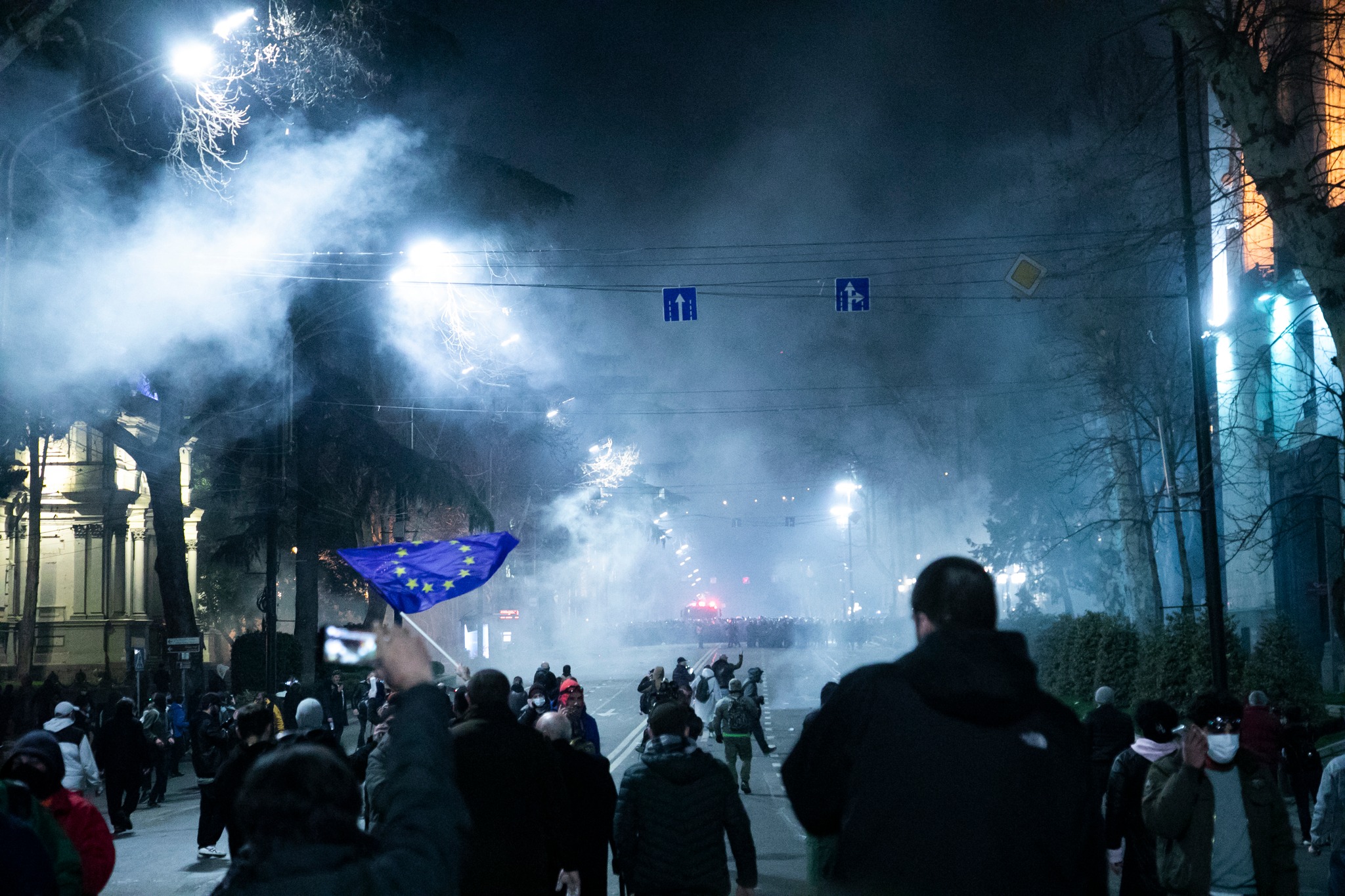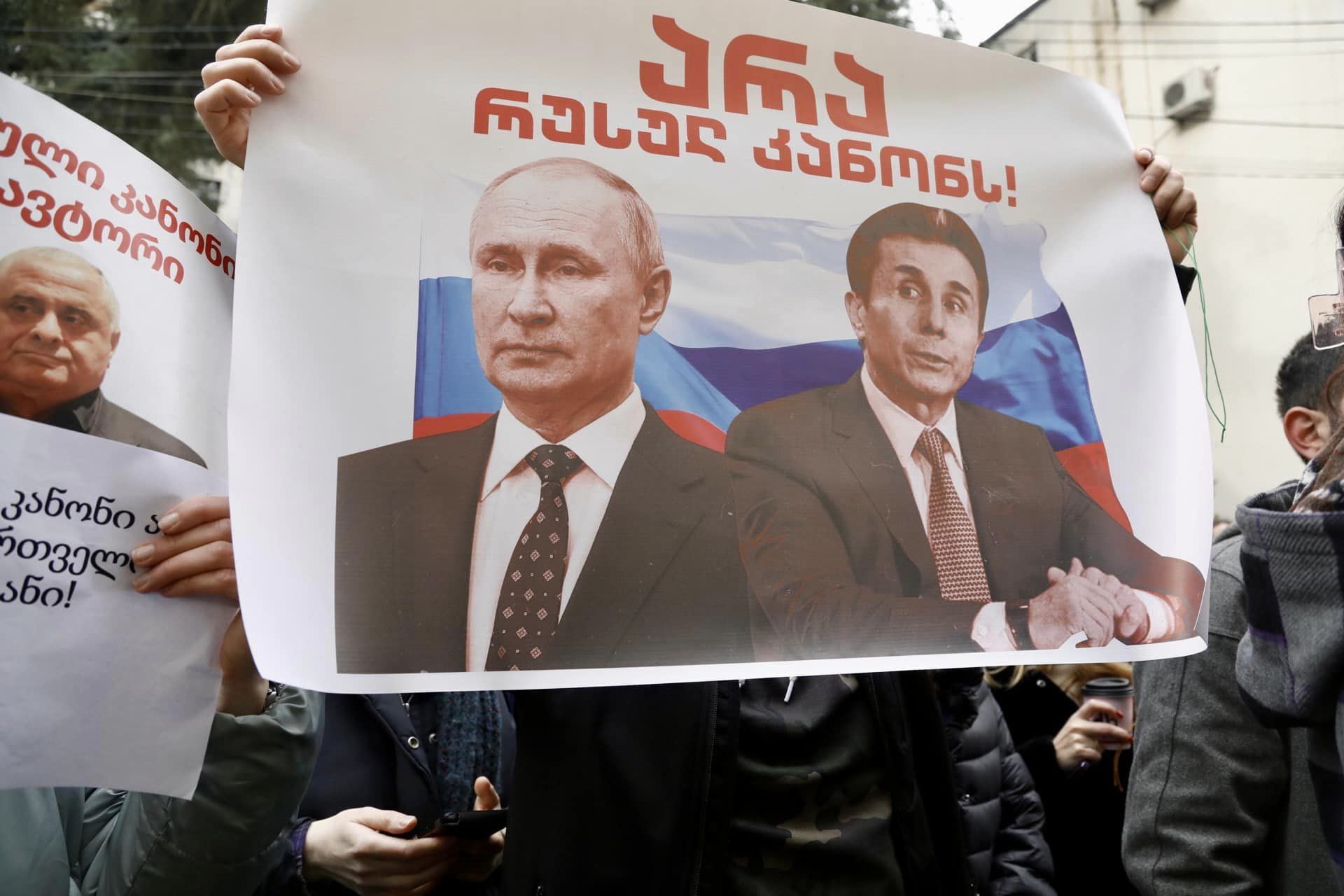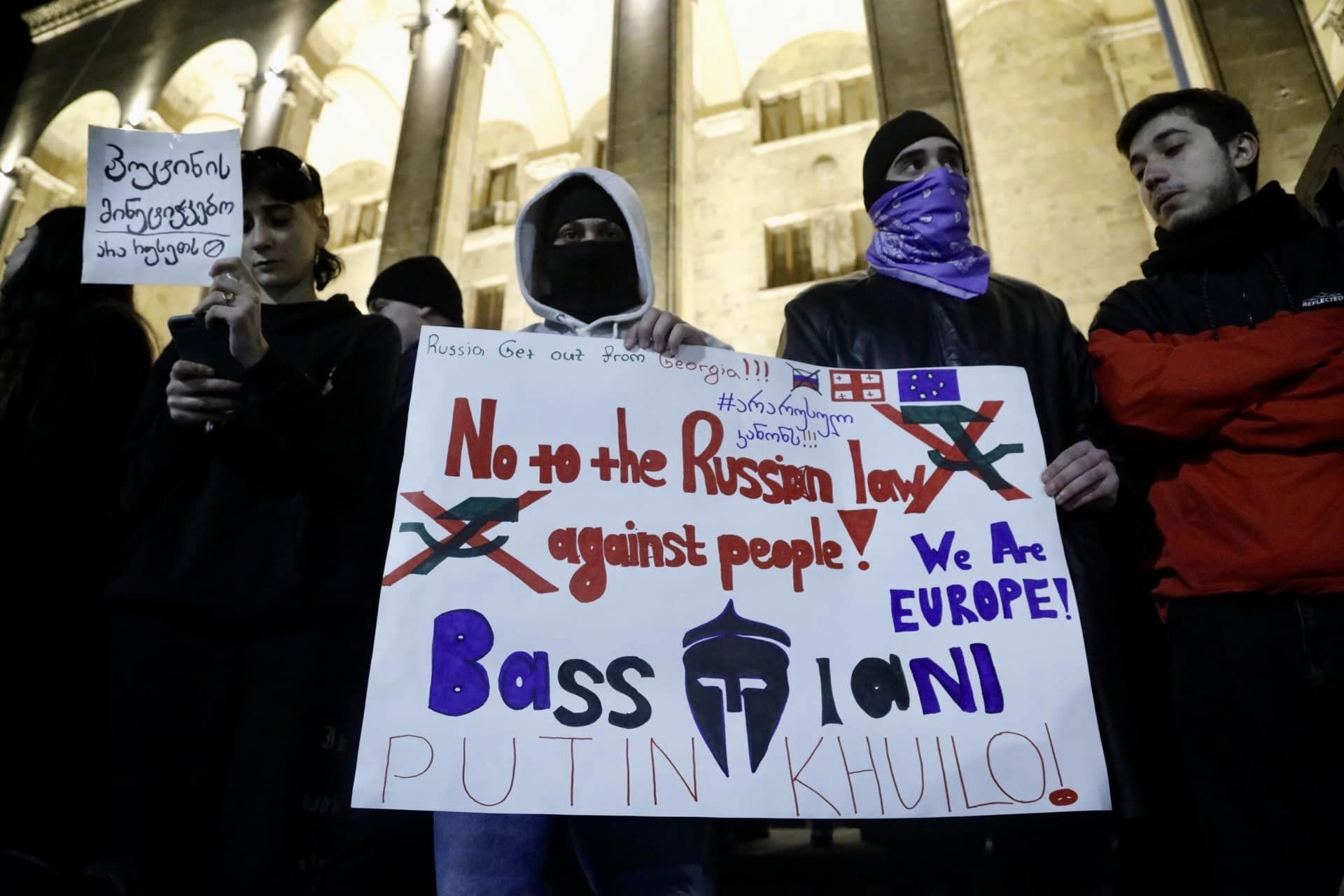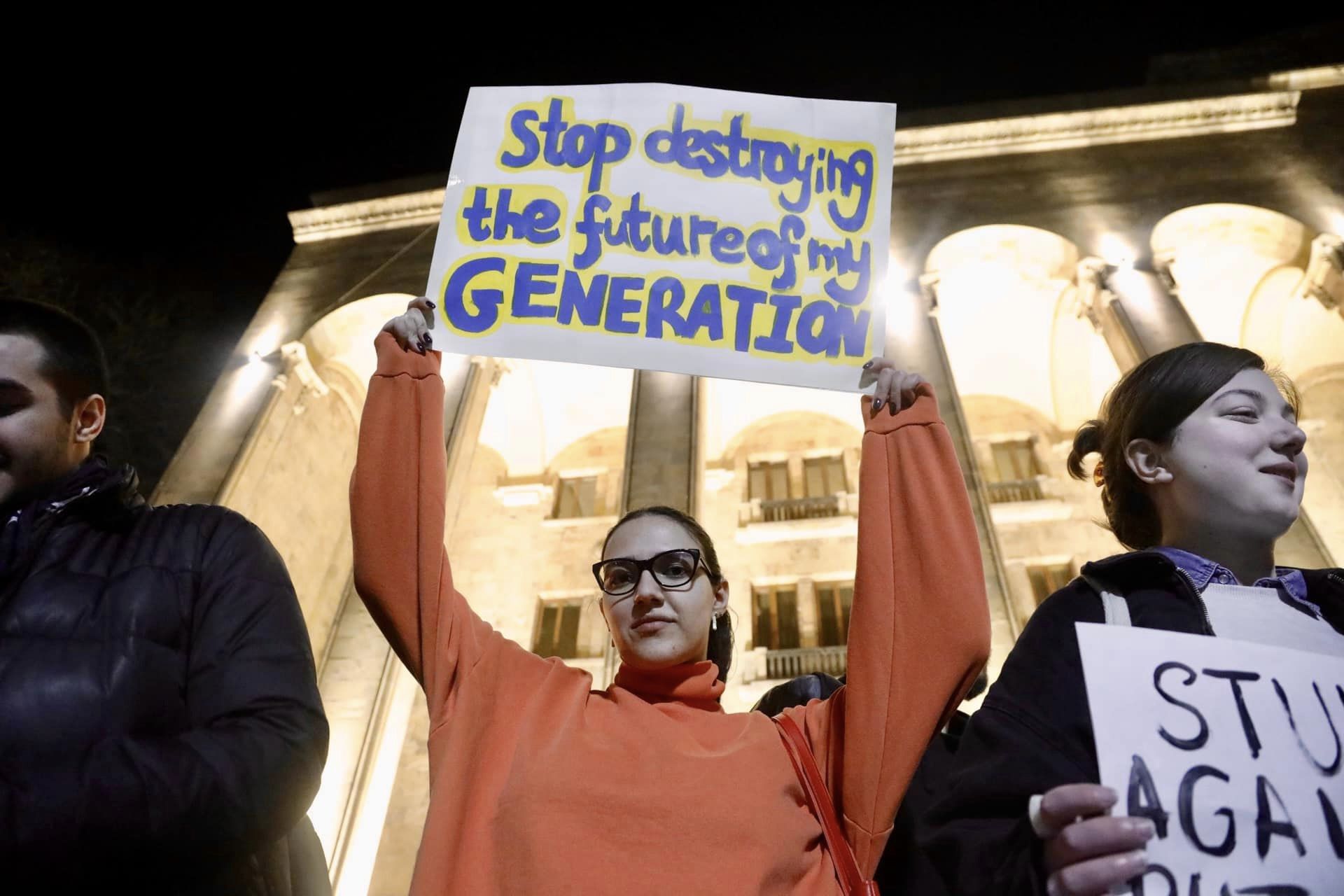Between Two Russian Laws: A Year Since March Protests
One year has passed since the 2023 March protests against the Russian-styled “Law on Transparency of Foreign Funding,” also known as the “foreign agents law.” Facing a massive domestic and international outcry against the controversial draft, the ruling Georgian Dream majority rammed it through the first hearing on March 8. Tens of thousands of Georgians, who felt this was the right and perhaps the last opportunity to make a clear choice between Russia and the West, made their way to the much-traveled Rustaveli avenue to voice their protest.
The enraged Georgians ultimately compelled the ruling GD to kill the bill. However, it seems there’s no cause for celebration just yet. One year later, its erstwhile initiators and supporters continued the witch hunt, announcing their crusade against “pseudo-liberals” and the “LGBT propaganda.” “The Russian Law 2.0” has not yet been drafted, but many believe it will be one of the campaign pillars for the ruling GD in the parliamentary elections looming this fall.
How it started
As Georgians, along with the rest of the world, eagerly anticipated the arrival of 2023, People’s Power, the radical spin-off of the ruling Georgian Dream party, made a vehement declaration to quash the country’s European aspirations.
On December 29, 2022, they unveiled their plan to draft legislation inspired by “the best Western practices,” intending to establish a registry for “agents of foreign influence” and regulate the dissemination of “fake news” by media outlets.
Despite attempts to liken it to the American Foreign Agents Registration Act/FARA, the proposed bill immediately invited parallels to Moscow’s illiberal practices, sparking widespread opposition from scholars, media, NGOs, and the international community.
Defiantly, on February 27, the majority faction at the Parliament’s bureau endorsed an even stricter version of the bill, expanding obligations to register as a “foreign agent” to individuals and hiking the penalties. In spite of the GD claims that the proposal mirrored U.S. legislation, the U.S. State Department Spokesperson condemned it, warning of its potential to undermine Georgia’s Euro-Atlantic integration.
While the ruling party agreed to send the draft to the Council of Europe’s Venice Commission, it decided not to wait for a potential negative conclusion and on March 7 passed the law in its first reading, in spite of the ongoing street protests and opposition of a large part of society, as well as the calls of international partners. However, faced with significant protests, both locally and internationally, the bill was eventually withdrawn on March 9.
A statement issued by the ruling majority on the morning of March 9 said: “We can see that the adopted bill has caused differences of opinion in society. The machine of lies managed to present the bill in a negative light and mislead a certain part of the public.” Lamenting that “the false label of “Russian law” was attached to the bill” the ruing majority blamed “the radical forces” for fueling protests, and pledged that it will “will better explain to the public what the bill was for and why it was important to ensure transparency of foreign influence in our country.”
The Protests and the Crackdown
Many see the ruling party’s inability to stifle civil society as one of its most significant failures during its eleven years in power. It appears that the Georgian Dream has underestimated the degree to which Georgia’s youths value living in a free country. Wider society also seemed to grasp and anticipate the consequences of the law on Georgia’s European future.
The protests against the Russian-style “foreign agents law” garnered extensive coverage in the international media, showcasing the heroic images of ordinary Georgians facing water cannons, making the Georgian voices heard in distant Brussels.
The people of Georgia once again demonstrated their steadfast dedication to European values, a sentiment believed by many to have been instrumental in the country finally securing its long-awaited EU candidacy in December 2023.
During the March 7-9 protests, in total 169 people were arrested and charged with administrative offenses or petty hooliganism and disobeying a law enforcement officer, while one was charged with assaulting a law enforcement officer, a charge that carries criminal liability. Among those arrested at the protest, there were politicians, including “Girchi-More Freedom” leader Zurab Japaridze and a party member Nika Mosiashvili, who were beaten by the law-enforcers during and after the arrest, as well as Giorgi Mumladze, a member of the “United National Movement.”
Multiple reports by local and international authoritative organizations later assessed the use of force by the law enforcers as disproportionate, unreasonable and arbitrary, as well as violating international standards for dispersing protests with special means. Moreover, according to watchdogs, police do not even provide explanation to the detainees on their minimum rights, defined by the Administrative Offences Code of Georgia. Moreover, during the court hearings, representatives of Interior Ministry were unable to provide evidence to prove lawfulness of detention.
A few days after the protests, the police arrested Lazare Grigoriadis, 22, for allegedly throwing stones and Molotov cocktails at police. He was subsequently sentenced to preventive detention on March 31, still awaiting the final verdict. His lawyers and defenders argued that Grigoriadis was innocent and was typecast for his appearance to fit the description of the “satanist” and “disoriented” youth that the ruling party leadership vilified after the protests.
In the months that followed, the GD representatives, guided by the PM Garibashvili unleashed an aggressive campaign aimed at smearing the groups of the society that had been particularly active during the March protests, including youth, liberal NGOs, youth clubs, civic activists and opposition political parties calling them “destructive”, “anarchist” and “extremist” forces.
“Beware the Ides of March”
Following the protests, the pressure from the West intensified, urging Georgian authorities to enact the substantial reforms upon which the EU’s candidacy for Georgia was contingent following its rejection in 2022. The reforms have never been fully implemented, and despite getting the candidacy, Georgia remains short of accession talks with the EU until the country implements the new nine steps.
On its part, the ruling party has stuck by its conservative rhetoric, leveraging “traditional values” and the sanctity of the church to attack opponents, incite violence, deepen polarization, and propagate anti-Western conspiracy theories.
With spring’s arrival, the ruling Georgian Dream party appears to be gearing up against queer community as an easier target to sway public opinion. However, if there’s one undeniable truth about Georgia, it’s that you never know what issues will ignite the passions of its public… As it has shown on many occasions that when push comes to shove, it will stand its ground and make the right choice.








